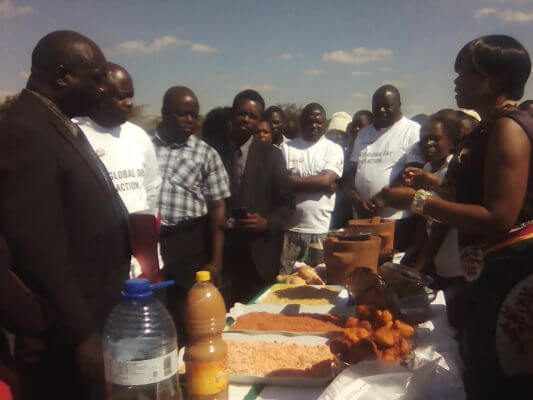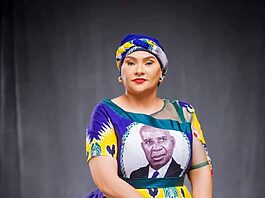

For I am the Lord, I change not; therefore ye sons of Jacob are not consumed. Even from the days of your fathers ye are gone away from mine ordinances, and have not kept them. Return unto me, and I will return unto you, saith the Lord of hosts. But ye said, Wherein shall we return? – Malachi 3:6-7a
“Malawi is addicted to maize(!)” read a blaring newspaper headline last year! To which my response is: there is nothing wrong with this addiction; a person has to grow his/her own food to feed the family, and then sell some! But when the going gets rough – and it has gotten rough several times these past 25 years! Therefore, the country is now in the stark raving mad stage and must create a contemporary dance, foodwise; it must do something new, when it comes to ‘what to do about our food needs!’ We MUST DIVERSIFY!
There is the need for Malawians to diversify what they grow for staple foods and what they feed their families. Our grandparents used to do this so effortlessly. Malawians also NEED to get off their waiting for the government to do something wagons and do the work of looking after themselves. I know it is a dirty phrase that reminds people of the 31-year dictatorial rule of Ngwazi Dr. H. Kamuzu Banda, but it was great medicine: Malawians must learn and get to doing some self-help activities, especially when it comes to feeding ourselves!
Recently I started the discussion on national resolutions for the year 2024. Malawi commemorates 60 years of independent rule from the UK (formerly Great Britain) on July 6, 2024, there are numerous great prescriptions the nation needs to adopt (consume), and strategies follow. The first was on how Malawians look at themselves and the role of government. There is a lot of missing love on both sides. Malawians must recalibrate their love for themselves, their country, and our leaders.
The second resolution is to diversify the country’s food staple from maize to other staples such as millet, sorghum, sweet potatoes, plantains, cabbage, cassava, pumpkins and others. Social media forums were ablaze when discussing a recent news headline that accused Malawians of being “addicted to maize.”
On a really truly remarkably close inspection, although a bit hyperbolic (exaggerated or inflated), there is some absolute truth in the comment.
No matter whichever way one tries to sanitize the matter, as almost two decades ago when Hendrina Givah (then a civil servant) put it “Men please stop saying you are waiting for food after eating rice or some other type of food served to you. Rice or pumpkins are also food.”
She was bemoaning the tendency many people had about what they considered to be food: many men at the time, if any staple other than nsima (made with maize flour), had been put on the table, they concluded that no food had been served. So, he would sit phwiii (still) without moving from the dining table, waiting for “food” to be served.
This is on the social side. On the political side, it is the same old game of “when things are not working out well, blame the good old stooges: the politicians!
While it is true that due to the acceptable and bleeding obvious fact that Malawi does not have any precious minerals (oil, uranium, gold, diamond, silver – NOTHING), maize was from the highest political podium brandished as our saving grace, easy for millions of peasants (plenty of them in the country up to now) to accept and embrace up to today, that growing maize for food with the surplus for sell, was a jolly good idea.
This worked as long as using the country’s very fertile land, good rains, equipped with government provided trained agricultural advisers, “there was no question of starvation in Malawi.”
But to the country’s bad poison with the recipe for “no hunger,” came various additives. It is these that dealt the doom knell to the country’s glory of the national staple called maize.
1. Government policy changed the maize seed supply from the traditional seed to the Monsanto seed. This gave a bigger kernel, BUT THE SEED IS A SELF-ABORTING SEED THAT IS ONLY GOOD FOR ONE PLANTING SEASON. PLANTERS HAVE TO BUY MAIZE SEED EVERY YEAR.
2. Introduction of store-bought, imported fertilizer, ditching manure that is plentiful and mostly thrown away country-wide.
3. Malawians changed from other sources of staple foods to using maize only for nsima; they dumped the other starches like flour from sorghum, millet, yam, plantain and cassava. My Grandma Edith (Gogo Eddey) Thipha used to serve us pumpkins for dinner, and we are still here and fine!
4. Chitedze-invented shortened-growth maize variety taken by the Brits who use it for their horse-feed variety. This maize has often found its way back into the country as food donations in times of famine. Oh that there was a Joseph in the Prime Minister’s chair in Malawi!
Malawi must undergo a major cultural shift in what it eats. Through the years, there have been many drivers in the country’s history that have directed the food habits of Malawians. These are missionaries, colonialists, and dictatorship rule; and yet with democracy, the controlling or directing is not there.
“During the other times (before democracy), a lot of traditional knowledge became inferior in many people’s minds compared to what others have in the world; and sovereignty over indigenous resources eroded,” a social media respondent told me.
He works for an NGO called NeverEndingFood Permaculture in Chitedze. He said the tendency of grading our traditional food as inferior, can and must change, but it will take people to understand the importance of indigenous resources, want to use them, and actually use them,” he said.
The NeverEndingFood Permaculture in Chitedze which came to Malawi in the 1990s at the dawn of democracy, focuses on indigenous species, and reviving them in our landscape and lives.
The official informed the social media forum chat group that such foods as rice, cassava, potatoes, and wheat are all exotic and were introduced to the country.
However, the country had indigenous staples such as several types of yams, sorghums, millets, and species like bananas & plantains, sweet potatoes (not the modern ones, which you cannot use stems to replant), and pumpkins.
He also advised that staple foods should be a small part of our diet, about 1/4 of it. The other parts should be the other food groups such as fruits, vegetables, and proteins (mostly plants like beans and soya) with a bit of animal products.
He said that Malawi has hundreds of indigenous foods and that there was the critical need to re-popularize these so that the country moves from its over-dependence on maize and consequently to donation and hand-outs when famine looms over the country.
After reverting to using the traditional maize seed, Malawians need to ditch fertilizer and start using natural fertilizers such as dung from cows or manure from chickens.
“There is no reason for Malawi to have the incessant hunger spells “with all the resources that we have,” the agricultural expert from Never Ending Food Program said. He said the country is replete with indigenous foods and food groups.
Let us diversify our eating habits!






